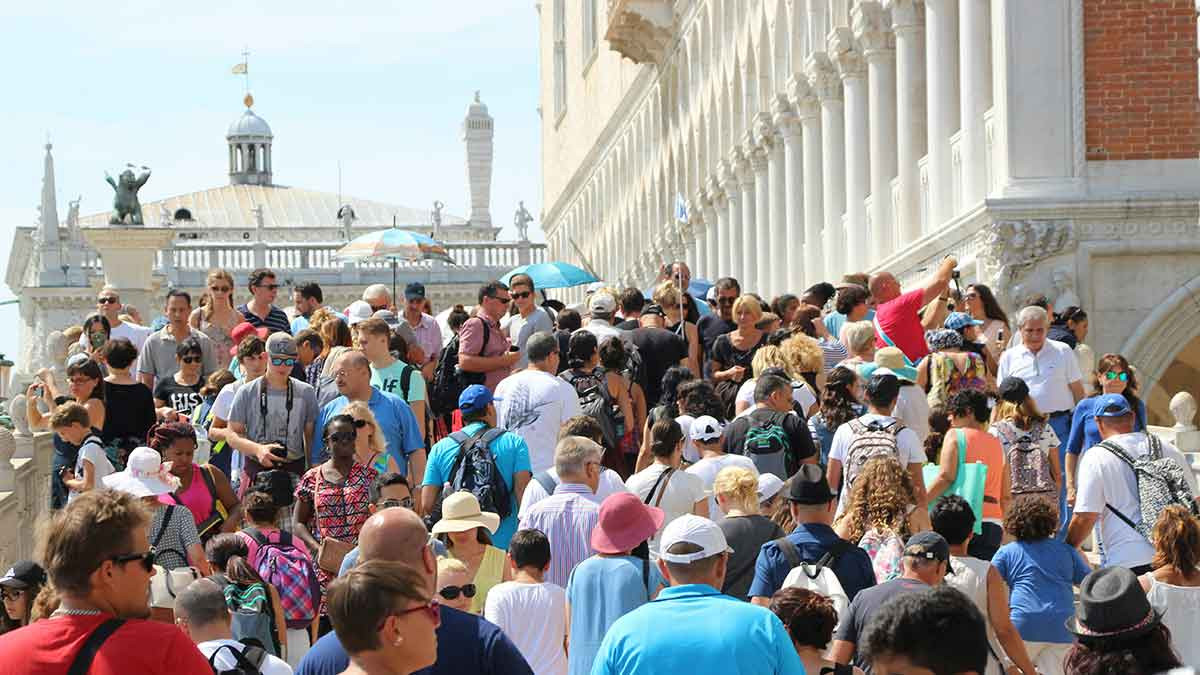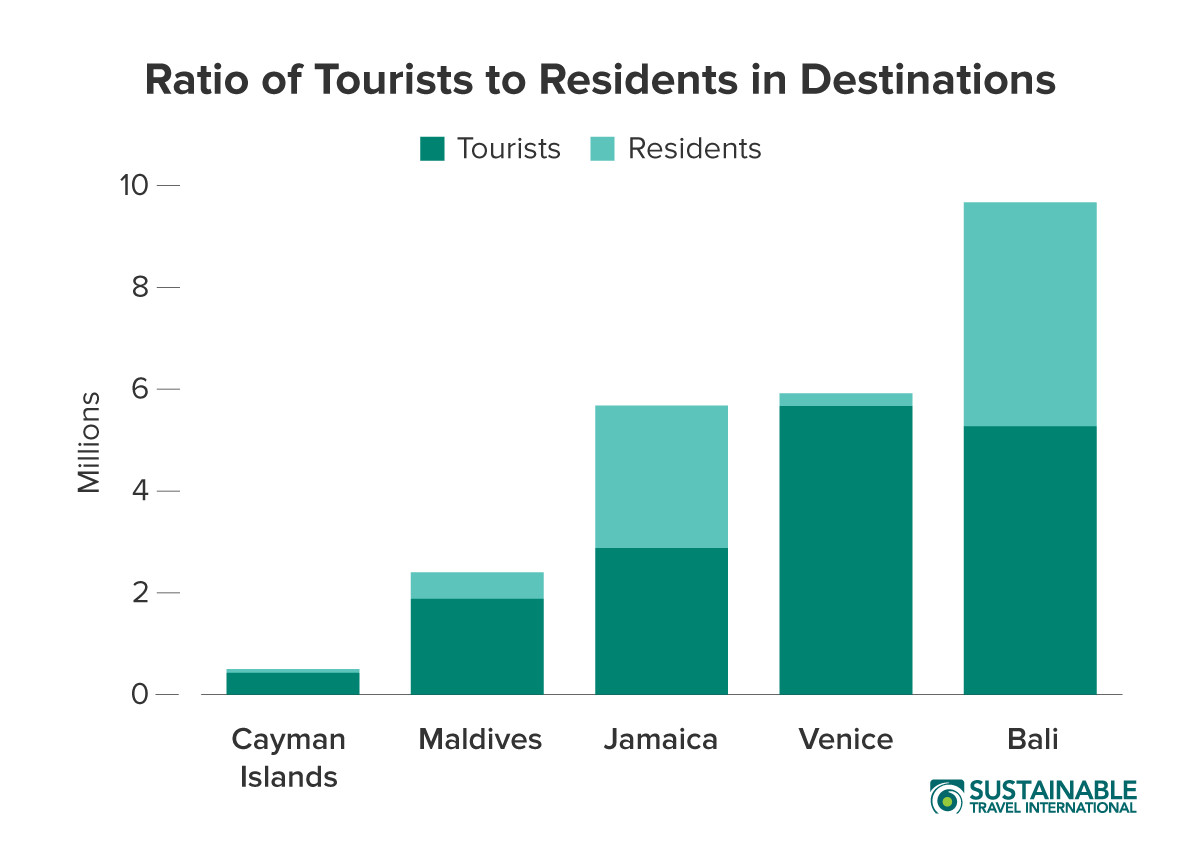Is tourism always beneficial, or can it sometimes create problems? Overtourism, the excessive influx of tourists exceeding a destination’s carrying capacity, poses significant challenges to the environment, local communities, and the visitor experience. SIXT.VN recognizes these challenges and provides sustainable and responsible tourism solutions for exploring Vietnam. This article explores the impact of overtourism and offers insights for responsible travel and tourism in Vietnam. Discover alternative destinations, support local businesses, and travel responsibly with SIXT.VN’s services, including convenient airport transfers and curated tours, for a memorable and impactful trip.
1. What is Overtourism and Where Does It Occur?
Overtourism is when too many visitors go to a place, creating negative effects. This is a problem in many popular tourist spots around the world, including some places in Vietnam. Overtourism occurs when the number of tourists exceeds a destination’s capacity to handle them sustainably. This can lead to overcrowding, environmental damage, strain on local infrastructure, reduced quality of life for residents, and a diminished visitor experience. Overtourism can occur in many types of destinations, including:
- Historic cities: Venice (Italy) and Dubrovnik (Croatia) struggle with overcrowding due to narrow streets and historic sites.
- Islands: Santorini (Greece) and Bali (Indonesia) face congestion and resource depletion due to limited land space and water resources.
- Natural attractions: Mount Everest and Maya Bay (Thailand) suffer from pollution and ecosystem degradation due to high visitor numbers.
- Cultural sites: Angkor Wat (Cambodia) experiences wear and tear on ancient structures due to heavy foot traffic.
According to a 2024 report by the UN World Tourism Organization, international tourist arrivals are expected to surpass pre-pandemic levels, highlighting the urgent need to manage visitation and protect the integrity of popular destinations.
 Venice, Italy is one of the most visited cities in the world. It is a known destination that deals with overtourism
Venice, Italy is one of the most visited cities in the world. It is a known destination that deals with overtourism
2. Why is Overtourism a Growing Issue?
Overtourism is rising because of several factors that make travel easier and more attractive to more people. Increased accessibility and affordability of travel lead to more people visiting popular destinations. The growth of the global middle class and the accessibility of travel have significantly contributed to the rise of overtourism. The COVID-19 pandemic provided a brief respite, but as travel rebounds, the issues associated with overtourism are resurfacing. Key drivers include:
- Growth of the Global Middle Class: More people have the money to travel.
- Cheaper and More Accessible Travel: Flights and accommodations are more affordable.
- Cruise Tourism: Large cruise ships bring many tourists to destinations at once.
- Rise of Short-Term Rentals: Services like Airbnb can reduce housing for locals.
- Changing Consumer Priorities: People value travel experiences more.
- Social Media: Platforms like Instagram inspire travel and create FOMO (fear of missing out).
- Digital Nomadism: Remote work allows people to travel and work from anywhere.
- Lack of Tourism Regulation: Many destinations lack proper planning and management.
According to Brookings, the global middle class is expanding rapidly, with an estimated 140 million people joining its ranks annually as of 2017, leading to increased travel demand.
3. What Are The Negative Impacts of Overtourism on Destinations?
Overtourism leads to several negative impacts on destinations, affecting the environment, local communities, and visitor experience. Understanding these effects is crucial for addressing and mitigating overtourism’s effects. Overtourism’s harmful impacts include:
- Overcrowding and Congestion: Too many tourists in one place make it unpleasant for everyone.
- Wear and Tear: Heavy foot traffic damages infrastructure and historical sites.
- Community Resentment: Locals can become frustrated with tourists due to increased costs of living and disrupted lifestyles.
- Competition for Resources: Tourists consume more water and energy, straining local resources.
- Environmental Consequences: Tourism development can destroy habitats and pollute ecosystems.
According to research, tourist behavior can exacerbate the situation when they disrespect local customs, vandalize sacred sites, or intrude on local life, leading to community resentment.
 A chart comparing the number of visitors to the umber of residents in overtouristed destinations
A chart comparing the number of visitors to the umber of residents in overtouristed destinations
4. How Does Overtourism Impact Local Communities and Residents?
Overtourism can significantly disrupt the lives of local residents, leading to resentment and decreased quality of life. The influx of tourists can lead to increased costs of living, making it difficult for residents to afford housing. Key impacts on local communities include:
- Increased Cost of Living: Housing and goods become more expensive.
- Displacement of Residents: Locals are forced to move due to rising costs.
- Loss of Cultural Identity: Communities become tourist attractions rather than places to live.
- Low-Wage Jobs: Locals often fill low-wage jobs while profits benefit external investors.
- Social Tensions: Resentment grows as residents feel tourism degrades their quality of life.
According to a report by the World Bank, cruise tourists make up over two-thirds of the Caribbean’s tourist arrivals, yet they spend only one-tenth as much on-shore as overnight visitors, highlighting the disproportionate economic benefits.
5. What Are The Environmental Consequences of Overtourism?
The strain on the environment from overtourism can lead to long-term damage to ecosystems and natural resources. Irresponsible tourism practices can severely degrade the environment. Environmental impacts include:
- Habitat Destruction: Natural ecosystems are converted for tourism infrastructure.
- Pollution: Waste and untreated sewage pollute water sources and ecosystems.
- Resource Depletion: Water, waste management, and energy resources are strained.
- Erosion and Damage to Natural Sites: Heavy foot traffic damages natural landscapes.
- Coral Reef Damage: Pollution and boat traffic harm coral reefs.
According to The Independent, Tulum’s beachfront hotels often run off dirty diesel generators, and their untreated sewage seeps into underground cenotes and rivers, polluting the world’s second-largest reef system.
6. Can Social Media Contribute to Overtourism Problems?
Social media can significantly contribute to overtourism by popularizing destinations and creating a “fear of missing out” (FOMO) effect. Platforms like Instagram influence travel choices and amplify the bucket list effect. Social media impacts include:
- Increased Destination Popularity: Little-known locations become tourist hotspots.
- FOMO Effect: People feel pressured to visit destinations they see online.
- Reckless Behavior: Tourists engage in risky activities to capture impressive photos.
- Damage to Sites: Irresponsible behavior leads to damage and tensions with locals.
- Overcrowding: Popular photo spots become extremely crowded.
According to American Express, 75% of travelers say they chose a specific destination because of social media, demonstrating its significant influence on travel decisions.
 An influencer walks around Chefchaouen, Morocco which has gone viral on the internet
An influencer walks around Chefchaouen, Morocco which has gone viral on the internet
7. What Actions Can Destinations Take to Combat Overtourism?
Destinations can implement various strategies to manage visitor numbers and mitigate the impacts of overtourism. Effective solutions include:
- Visitor Limits: Imposing caps on the number of visitors allowed at a given time.
- Timed Entry Permits: Controlling visitor flow with scheduled entry times.
- Discouraging Fees: Introducing fees to discourage visitation during peak times.
- Promoting Alternative Destinations: Encouraging tourists to explore lesser-known areas.
- Educating Tourists: Raising awareness about responsible behavior and cultural respect.
- Banning New Hotels: Restricting the construction of new accommodations to limit capacity.
- Regulating Short-Term Rentals: Controlling the number of vacation rentals to protect housing for locals.
- Partnering with Influencers: Promoting less-visited destinations through social media campaigns.
For example, Amsterdam has imposed limits on river cruises and banned the construction of new hotels to reduce congestion, and Venice introduced a day-tripper fee to discourage visitation on peak days.
8. What Can Travelers Do to Promote Responsible Tourism and Reduce Overtourism?
Travelers play a crucial role in mitigating overtourism through responsible and sustainable choices. Sustainable travel helps ensure that tourism benefits both visitors and local communities. Actions include:
- Travel Off-Season: Visit destinations during less crowded times.
- Explore Alternative Destinations: Discover lesser-known regions and attractions.
- Respect Local Culture: Follow customs and traditions to show respect.
- Support Local Businesses: Shop and dine at locally owned establishments.
- Reduce Waste: Minimize your environmental impact by reducing, reusing, and recycling.
- Use Public Transport: Opt for buses, trains, or bikes instead of private cars.
- Choose Eco-Friendly Accommodations: Stay in hotels and guesthouses committed to sustainability.
- Educate Yourself: Learn about the destination’s challenges and how to help.
By making mindful choices, travelers can contribute to a more sustainable and balanced tourism industry.
9. How Can Tourism Companies Contribute to Solving Overtourism Issues?
Tourism companies have a significant role in addressing overtourism by adopting responsible practices. Strategies for companies include:
- Visitor Dispersal: Planning trips that alleviate pressure on over-visited destinations.
- Community Benefits: Creating tourism experiences that benefit local communities.
- Education: Informing visitors about sustainable practices and responsible behavior.
- Sustainable Practices: Implementing eco-friendly operations and reducing environmental impact.
- Partnering with Locals: Working with local businesses to ensure economic benefits stay within the community.
Tourism companies can help avoid overtourism by implementing visitor dispersal strategies and impact management to explore specific tips and examples.
10. Where in Vietnam Is Tourism a Problem, and How Can SIXT.VN Help?
While Vietnam offers stunning landscapes and vibrant culture, some areas are experiencing increased tourism pressure. Destinations like Ha Long Bay, Hoi An Ancient Town, and Sapa have seen rapid growth in visitor numbers, leading to overcrowding and environmental concerns.
- Ha Long Bay: Overcrowding on cruises and pollution from boats. Consider visiting Lan Ha Bay or Bai Tu Long Bay for a similar experience with fewer crowds.
- Hoi An Ancient Town: Congestion in the old town and increased prices. Explore nearby Tam Ky or Phu Yen for a more authentic experience.
- Sapa: Heavy foot traffic on trails and environmental degradation. Venture to Ha Giang or Mu Cang Chai for stunning landscapes with fewer tourists.
SIXT.VN offers services that help travelers explore Vietnam responsibly and sustainably. SIXT.VN provides airport transfers, hotel booking assistance, tour services, and car rentals, making travel easier and more sustainable. With SIXT.VN, you can:
- Airport Transfers: Enjoy hassle-free and reliable transportation from the airport to your hotel, ensuring a smooth start to your trip. Address: 260 Cau Giay, Hanoi, Vietnam. Hotline/Whatsapp: +84 986 244 358.
- Hotel Booking: Choose from a curated selection of eco-friendly and locally-owned accommodations that prioritize sustainability.
- Tour Services: Participate in guided tours that support local communities and promote responsible travel practices.
- Car Rentals: Explore Vietnam at your own pace with flexible and eco-friendly transportation options.
- Travel Advice: SIXT.VN provides valuable travel advice and insights on responsible tourism practices, helping you make informed decisions that minimize your impact and maximize your positive contributions to the local communities you visit.
By choosing SIXT.VN, you support sustainable tourism practices and help preserve Vietnam’s natural and cultural heritage.
Overtourism is a complex issue with significant impacts on destinations worldwide. However, by understanding the causes and consequences, destinations, tourism companies, and travelers can take action to mitigate these effects. Responsible tourism practices, such as traveling off-season, exploring alternative destinations, and supporting local businesses, can help create a more sustainable and balanced tourism industry. With careful planning and conscious choices, we can ensure that tourism benefits both visitors and local communities for years to come. For responsible and sustainable travel solutions in Vietnam, visit SIXT.VN and start planning your impactful trip today.



